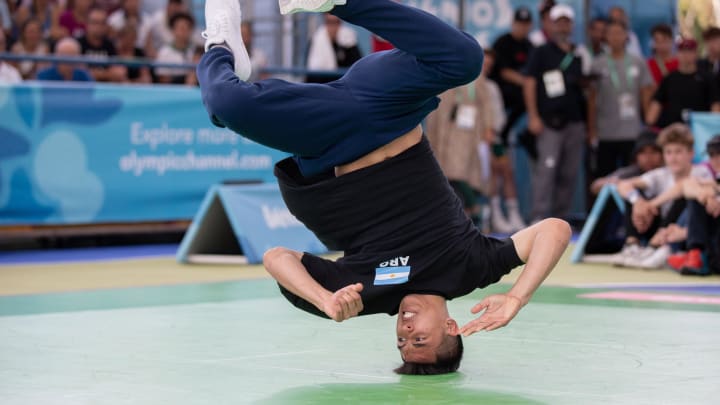What is Breaking at the Olympics? Explaining the New Olympic Event

The 2024 Paris Olympics are finally here, and with this year's Games comes a couple of new events. There is kayak cross, a canoe slalom event debuting for the first time. There will be a men's competition for artistic swimming, an Olympic first. But perhaps the most fascinating new event is breaking, which debuted at the Youth Olympic Games in 2018 and was successful enough to be introduced into the 2024 Paris games.
As is the case when a new event is introduced into the Olympics (and even when it's not a new event), there is a good chance you're going to turn on the television and be presented with a sport you do not understand at all. So, in this space, we endeavor to inform you everything you need to know about the sport breaking and how to enjoy it.
What is Breaking?
In more casual terms, breaking is a more formalized version of break dancing. Described by the Olympics website as an "urban dance style" with roots in hip-hop culture, it is probably very similar to what you're imagining—a dance style with a low center of gravity involving plenty of twists, spins, and precise footwork while using every part of the body as leverage.
Unlike some of the more off-the-beaten-path Olympic sports, breaking will at least look familiar to the average American consumer due to its presence in pop culture. See: the Step Up movie series.
How does breaking work in the Olympics?
Of course, what Channing Tatum was doing as Tyler Gage is a little different than what the athletes competing at the Olympics will do. So how, exactly, will breaking work in Paris?
There will be 32 participants in total— 16 men and 16 women, called "B-Boys" and "B-Girls." They will face each other in one-on-one competitions in a round robin format to begin before moving to elimination-style leading into the medal match.
Each "battle" consists of three one-minute performances for each contestant. The battle is over when one breaker wins two rounds. As explained by the Olympics website, "Athletes will use a combination of power moves—including windmills, the 6-step, and freezes—as they adapt their style and improvise to the beat of the DJ’s tracks in a bid to secure the judges’ votes and take home the first Olympic breaking medals."
As suggested above, these will not be choreographed routines. It is not figure skating, where every last movement is finalized months before the Olympics and the music is all customized for each routine. Breakers do not know what music will play when it's time to battle and instead must improvise based on what they hear. It is, therefore, not just a battle of dance, but a war of creativity, too.
How is breaking scored?
All that begs the natural next question— how does a breaker win?
According to NBC, breaking will feature a panel of nine judges. They will evaluate each performance based on six aspects of breaking: creativity, personality, technique, variety, performativity and musicality.
Each category is not weighed equally, however. Performativity and creativity account for 60% of the scores, while the other four account for 40%.
Who are the top breakers at the Olympics this year?
As, effectively, a brand-new sport there is no famous breaker the world knows will come into Paris and dominate. It opens the door for someone to make a name for themselves and a mighty impression on the international community.
On the men's side, NBC lists Americans Victor Montalvo and Jeffery Louis as competitors to watch along with Canada's Philip Kim, Japan’s Shigeyuki Nakarai, and France’s Danis Civil.
For the women, Sunny Choi and Logan Edra will represent the U.S. as two top breakers. Additionally, Dominika Banevic of Lithuania, Say Dembele of France, and Ayumi Fukushima of Japan are expected to put forth strong appearances.
Breaking at the 2028 Olympics
In a rather shocking turn of events, breaking was not chosen as a sport for the Los Angeles Games in 2028. The International Olympic Committee opted to go a different direction before even seeing how breaking plays in Paris. The World DanceSport Federation was "profoundly disappointed" in this development.
This means the 2024 Games are quite important for the future of breaking at the Olympics. If it draws enough eyeballs and attention then the IOC will be forced to consider bringing it back for the 2032 Olympics in Brisbane, Australia. If not, this may be your one and only chance to see breaking on this kind of international stage.
So.... enjoy while you can!
